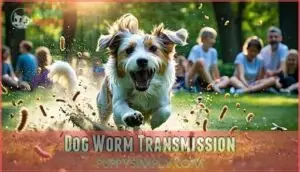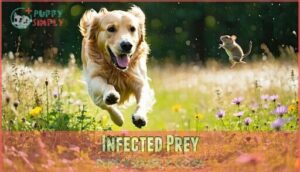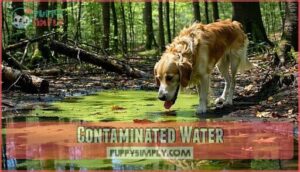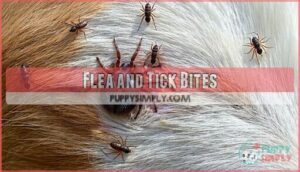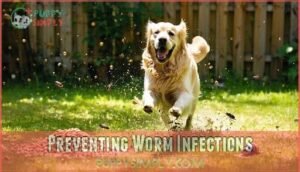This site is supported by our readers. We may earn a commission, at no cost to you, if you purchase through links.

They might sniff or eat infected feces, play in contaminated soil, or drink dirty water.
Fleas and ticks can also pass on certain types of worms, like tapeworms.
Puppies are especially at risk, often getting worms from their mother before or shortly after birth.
Hunting or eating small infected animals, like rodents, is another common cause.
These parasites can impact your dog’s health, causing symptoms like weight loss, diarrhea, and fatigue.
Understanding how dogs get worms is the first step to protecting your pet—there’s plenty you can do to keep them safe and healthy!
Table Of Contents
- Key Takeaways
- Dog Worm Transmission
- How Dogs Get Worms
- Types of Worms
- Worm Infection Risks
- Preventing Worm Infections
- Frequently Asked Questions (FAQs)
- What are the signs that a dog has worms?
- Can an indoor dog get worms?
- What foods give dogs worms?
- What causes dogs to get worms?
- How can I tell if my dog has worms?
- How often should I deworm my dog?
- Are there any natural remedies for worms in dogs?
- What are the most common types of worms in dogs?
- Can I prevent my dog from getting worms?
- Can worms in dogs infect humans?
- Conclusion
Key Takeaways
- Your dog can get worms by sniffing or eating contaminated feces, playing in infected soil, or drinking dirty water.
- Fleas, ticks, and eating infected prey like rodents can transmit parasites like tapeworms.
- Puppies are highly vulnerable, often getting worms from their mother during pregnancy or nursing.
- Regular deworming, clean environments, and flea prevention are essential to keep your dog safe.
Dog Worm Transmission
Your dog can get worms through various routes including contaminated soil, feces, infected prey, and even from their mother before birth or through nursing.
Protect your dog from worms by understanding transmission routes like soil, feces, infected prey, and even mother-to-puppy transfer. Stay proactive!
You’ll need to understand these transmission paths to protect your furry friend from these common parasites that can cause serious health problems if left untreated.
Fecal-Oral Route
Your dog’s most common path to worm infection happens through the fecal-oral route.
The fecal-oral route is the sneaky gateway for worms, exposing dogs to parasites through contaminated soil, feces, and everyday sniffing adventures.
When your pet sniffs, licks, or eats soil contaminated with feces, they’re exposed to parasitic eggs that can survive for years in the environment.
These intestinal parasites spread through direct contact with stool or indirect fecal contamination.
Coprophagia risks are particularly high, as egg persistence in the environment makes larval exposure almost inevitable without proper precautions, involving parasitic eggs.
Mother to Puppy
Your puppies can inherit more than just cute traits from their mother.
Prenatal transmission occurs when worms cross the placenta, infecting puppies before birth.
After delivery, milk contamination continues the cycle as roundworm and hookworm larvae pass through nursing.
Puppy susceptibility is highest during these early stages, making preventative deworming essential.
Good maternal health reduces transmission risks, so proper puppy care includes deworming both mother and offspring to break this inherited cycle, ensuring a healthier start with proper care.
Contaminated Soil
While puppies often get worms from mom, your yard might be the bigger culprit.
Contaminated soil harbors parasitic eggs that can survive for years in tough conditions.
Your dog’s natural sniffing and digging behaviors put them at risk for egg ingestion and larval exposure.
Environmental factors like moisture and shade increase persistence, while wild animal feces introduce new parasites.
Daily yard cleanup reduces this environmental contamination risk substantially.
Regular fecal exams detect worm eggs, aiding early detection of worm eggs in a contaminated environment.
How Dogs Get Worms
Despite your best efforts, your furry friend can encounter parasites through everyday activities.
Understanding how dogs get worms helps you protect your pet from these common invaders.
Your dog may contract worms through:
- Direct worm egg ingestion from contaminated soil or surfaces where infected dogs have eliminated
- Maternal worm transfer when puppies receive parasites through their mother’s milk or during pregnancy
- Hunting risk factors when your dog catches and consumes infected wildlife like rodents or birds
- Contaminated water sources that harbor parasitic organisms, especially in stagnant ponds or puddles
- Coprophagia dangers when your dog eats feces (their own or from other animals)
These transmission routes apply to various dog parasites including roundworms, hookworms, and tapeworms.
Some parasites can even penetrate your dog’s skin directly when they lie on contaminated ground.
Regular veterinary checks help catch infections early, and understanding these risks is key to protecting your dog from common invaders.
Types of Worms
You’ll need to recognize the main worm types threatening your dog’s health, including roundworms, hookworms, whipworms, and tapeworms.
Each type presents different symptoms and requires specific treatments, making identification essential for your pet’s wellbeing.
Roundworms
Nearly all puppies encounter roundworms during their lives.
These parasites, primarily Toxocara canis and Toxascaris leonina, live in your dog’s intestines, feeding on partially digested food.
Roundworms in dogs can cause a pot-bellied appearance, diarrhea, vomiting, and weight loss.
They’re especially concerning due to their zoonotic potential and multiple transmission routes, including through the mother during pregnancy or nursing.
Environmental survival of eggs makes prevention challenging, requiring regular deworming and prompt feces removal.
Regular fecal exams are essential for early detection.
Hookworms
Hookworms in dogs are stealthy invaders, causing serious health risks like anemia through Larval Migration.
These parasites infect by:
- Skin Penetration: Larvae burrow into your pet’s paws after soil contact.
- Fecal Contamination: Ingesting infected material.
- Geographic Prevalence: Warm, damp areas boost infections.
- Zoonotic Risk: Humans can catch them too!
- Mother-to-Puppy: Passed in milk.
Prevention is critical!
Whipworms
Whipworms in dogs are tricky and persistent.
These dog intestinal parasites attach to the large intestine, causing bloody diarrhea, weight loss, and fatigue.
Whipworm symptoms may not show immediately, so regular fecal exams are essential for whipworm diagnosis.
| Key Facts | Details |
|---|---|
| Whipworm Lifecycle | Eggs thrive in soil for years. |
| Whipworm Symptoms | Bloody stool and weight loss. |
| Prevention Tips | Remove feces promptly and use monthly meds. |
The key to managing whipworms is understanding their lifecycle and taking preventive measures.
Tapeworms
Tapeworms in dogs are flat, segmented parasites commonly spread by fleas or eating raw meat.
Flea transmission happens when your dog ingests an infected flea, leading to tapeworm segments (proglottids) appearing in stool.
Though tapeworms rarely cause severe issues, they pose a zoonotic risk.
- Prevention methods: Use flea control products.
- Check for tapeworm segments regularly.
- Avoid feeding raw meat.
Worm Infection Risks
Your dog faces worm infection risks in surprising ways, from eating infected feces to drinking contaminated water. Understanding these common transmission routes is key to protecting their health.
Eating Feces
Dogs eating feces, or coprophagia, is a common way to ingest intestinal parasites.
Stool can harbor worm eggs, continuing the reinfection cycle.
Puppies often explore with their mouths, increasing risk.
Removing feces promptly lowers exposure.
Dietary deficiencies may also drive the behavior, so balanced nutrition helps.
| Risk Factor | Impact | Prevention Steps | Example |
|---|---|---|---|
| Coprophagia Risks | Worm infestations | Remove stool quickly | Dog eating feces in the yard |
| Reinfection Cycle | Persistent parasites | Regular stool removal | Worm eggs ingested during coprophagia |
| Stool Removal | Reduces parasite risk | Clean environment | Daily poop pick-up during walks |
| Puppy Behavior | High risk for worms | Supervise outdoors | Puppies licking contaminated areas |
The behavior can be driven by multiple factors, including dietary deficiencies and the natural curiosity of puppies.
Supervising puppies outdoors and maintaining a clean environment are crucial steps in preventing coprophagia.
Regular removal of stool and ensuring balanced nutrition can significantly reduce the risk of intestinal parasites.
Infected Prey
Chasing and catching wild animals might seem natural, but rodent hunting or eating infected prey puts your dog at risk.
Wildlife exposure often leads to infections from parasites in birds or rodents. A raw diet with contaminated meat can introduce worms like tapeworms or hookworms.
Hunting risks grow with exposure to wild animals, so stay cautious!
Contaminated Water
Drinking contaminated water puts your dog at risk for waterborne parasites like Giardia, as well as bacterial infections such as leptospirosis.
Parasites thrive in stagnant water, ponds, or polluted streams.
- Dangers: Vomiting, diarrhea, weight loss.
- Giardia risks: Severe dehydration.
- Leptospirosis threat: Organ damage.
- Preference: Clean water only.
- Prevention methods: Monitor drinking sources closely.
Flea and Tick Bites
Fleas and ticks aren’t just annoying—they can transmit worms and dangerous vectorborne diseases.
By ingesting fleas, your dog risks tapeworm infections. Ticks, known for spreading tick paralysis, also carry harmful pathogens.
Mosquito bites amplify risks, spreading heartworms. Regular flea and tick prevention, bite prevention strategies, and treatment options guarantee your dog stays safe and healthy.
Prevention is your best defense. Effective pills provide year-round preventative use against these pests.
Preventing Worm Infections
Keeping your dog safe from worms starts with a few simple steps, like regular vet visits and preventive care.
By staying proactive with deworming, flea control, and a clean environment, you can greatly reduce the risk of infection.
Regular Stool Checks
Spotting dog worms early can save you headaches later. Regular stool checks help monitor fecal consistency and detect intestinal parasites.
Here’s how:
- Observe stool for changes or worms.
- Collect a stool sample routinely.
- Parasite identification requires a vet’s fecal exam.
- Vet analysis catches hidden worms in dogs.
A dog’s stool analysis can provide valuable insights into their health. Use preventative measures to protect your pet’s health.
Deworming Medication
Deworming dogs is essential to prevent infections. Use dewormer medication like mebendazole or pyrantel pamoate as prescribed. Choose the right dewormer types based on worms present.
Follow dosage methods carefully, as improper use may cause side effects or resistance issues. Preventative deworming every 4-6 months keeps your dog safe. Always consult your vet for dog worm treatment and dog worm medicine.
Pyrantel pamoate requires careful attention to correct medication dosage.
| Dewormer Types | Dosage Methods | Side Effects |
|---|---|---|
| Pyrantel Pamoate | Chewable tablets | Temporary nausea |
| Mebendazole | Liquid form | White blood cell changes |
| Albendazole | Prescription pills | Gastrointestinal upset |
| Ivermectin | Monthly chewables | Low risk if dosed properly |
| Combination formulas | Vet-recommended | Resistance risk if overused |
Flea and Heartworm Prevention
Heartworm disease and fleas are no joke.
Year-round protection with heartworm medication and flea prevention is your best bet. Preventative options like mosquito control stop heartworms in dogs before they start.
Flea control is key to breaking the flea lifecycle. Stay consistent with treatments to protect your dog from these pests, keeping them safe and healthy.
Consider using topical flea treatments for long-lasting protection, and remember that year-round protection is crucial for your dog’s health.
Environmental Control
Managing your dog’s surroundings is key to worm prevention.
Focus on keeping outdoor areas safe and clean:
- Soil Sanitation: Remove feces promptly to reduce parasite risks.
- Water Management: Avoid letting dogs drink from contaminated water.
- Waste Disposal: Dispose of waste properly to protect shared spaces like dog parks.
- Garden Safety: Secure play areas to prevent contact with infected soil or wildlife.
For responsible cleanup, consider using reliable disposal bags.
Frequently Asked Questions (FAQs)
What are the signs that a dog has worms?
Your dog might’ve worms if you notice weight loss, diarrhea, a bloated belly, vomiting, or a dull coat.
You may even see worms or segments in their stool or around their rear.
Can an indoor dog get worms?
Even if your dog stays indoors, it can still get worms.
Fleas, contaminated soil on shoes, or eating something infected—like raw meat—can expose them.
Regular checkups and prevention keep your pup safe.
What foods give dogs worms?
Eating raw or undercooked meat, consuming fish, or accidentally ingesting fleas can give worms to dogs.
Contaminated food or water also poses risks, making it essential to monitor your dog’s diet and environment carefully.
What causes dogs to get worms?
It’s ironic how a dog’s curiosity can invite trouble—worms find their way through contaminated soil, feces, infected prey, or even a mother’s milk.
These parasites thrive on opportunity, exploiting every chance to spread.
How can I tell if my dog has worms?
Look for signs like diarrhea, weight loss, a bloated belly, or vomiting.
Roundworms might appear in stool or vomit, and tapeworm segments resemble little rice grains near the anus or in poop.
How often should I deworm my dog?
Imagine your dog picking up worms at the park.
Deworm every three months for adult dogs, but monthly for puppies.
Adjust if they hunt, roam, or travel.
Regular vet checkups help keep them worm-free.
Are there any natural remedies for worms in dogs?
You can try natural remedies like ground pumpkin seeds, garlic (in tiny, vet-approved amounts), or diatomaceous earth.
Always consult your vet before using these options to guarantee your dog’s safety and proper treatment.
What are the most common types of worms in dogs?
Dogs face tiny troublemakers like roundworms, hookworms, whipworms, tapeworms, and sometimes heartworms.
These pests sneak in through soil, feces, fleas, raw meat, or mosquito bites.
Regular vet checks and prevention keep your pup safe.
Can I prevent my dog from getting worms?
You can prevent worms by keeping your dog’s environment clean, using regular deworming treatments, protecting them from fleas, and avoiding raw meat.
Promptly pick up stool, and make certain they don’t drink from untreated water sources, to ensure a safe and healthy environment, which is crucial for preventing worms, especially by avoiding raw meat.
Can worms in dogs infect humans?
Yes, some dog worms can infect humans, especially roundworms and hookworms.
These parasites spread through contaminated soil or feces.
Practicing good hygiene, regular deworming, and cleaning up after your dog reduces the risk.
Conclusion
Protecting your dog from worms is like locking the front door to keep out intruders—simple steps make a big difference.
Understanding how dogs get worms helps you stay proactive, whether it’s avoiding contaminated soil, treating fleas, or regular deworming, each action keeps your pet healthier.
Puppies, especially, need extra care since they’re more vulnerable, keep an eye on their habits, provide clean water, and maintain preventive care.
Your efforts guarantee a happier, worm-free life for your dog.

